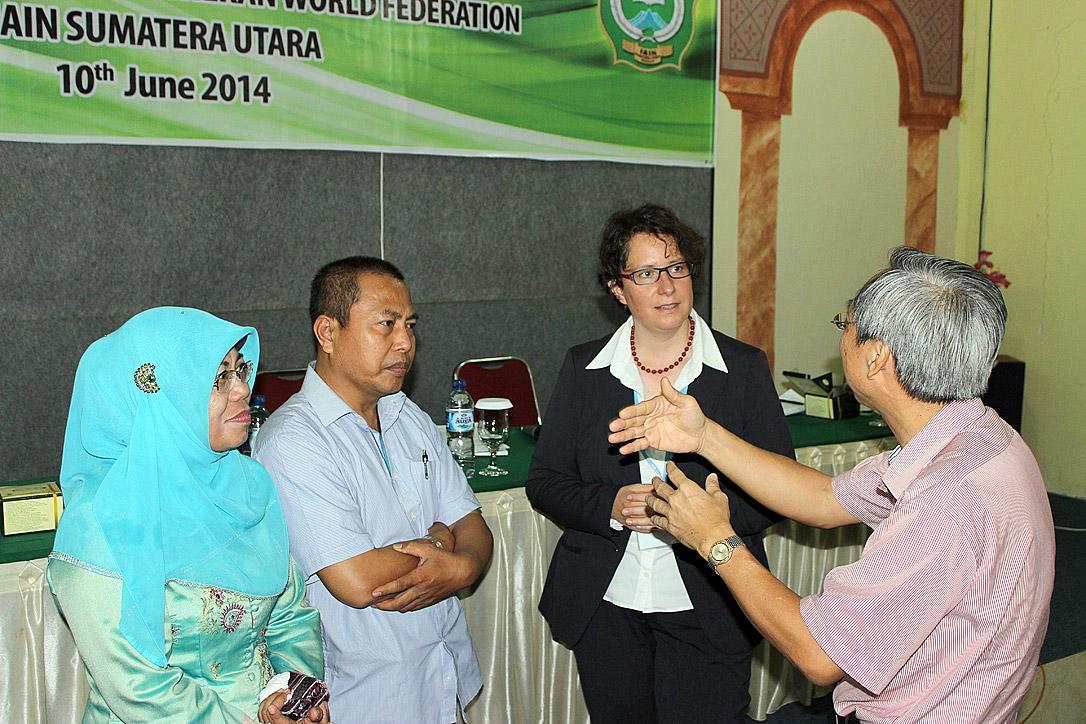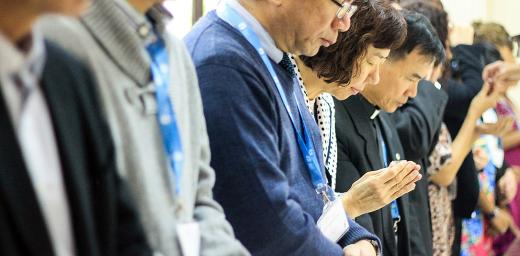Islamic Higher Education Institute Becomes Place for Dialogue

Conversation with members of the Interreligious Forum in Medan during the pre-Council dialogue meeting âTraining Religious Leaders for the Future.â Photo: LWF/R. Ruggaber
By Rev. Dr Simone Sinn
Prior to the 2014 LWF Council meeting in Medan, Indonesia, the State Islamic Institute (IAIN) in North Sumatra opened its doors for Lutherans to visit the institute and engage in a dialogical conversation on “Training Religious Leaders for the Future.”
As the bus with 17 LWF Council participants drove onto the IAIN campus in Medan, we saw on the left hand side many young women sitting in groups in the shade of trees in front of the first building. This was the faculty for education, those who study here will become teachers for Islamic education in public or private schools in Indonesia.
The driver continued and then stopped in front of another building with a lecture hall that belongs to the Center for Languages. We were met there by lecturers from different faculties in the IAIN, together with representatives of the Interreligious Forum (FKUB) in Medan and lecturers and pastors from Lutheran churches.
This dialogue meeting on 10 June was initiated by the LWF Interreligious Program which is part of the LWF Department for Theology and Public Witness and welcomed by the IAIN academic staff as a unique opportunity for interreligious – and at the same time intercultural - dialogue with people from different contexts.
At the IAIN more than 8000 students study in five faculties: education, theology, law, communication and economy. Whereas the faculty for education is the biggest with more than 2000 students, the faculty for economy is situated in a recently built and therefore most modern building. Plans are already underway to expand the IAIN to a full university with other faculties and move to a bigger campus site.
Indonesian Approaches to Diversity
As a kick-off for this day of encounter and dialogue, Prof. Dr Amroeni from the faculty for theology gave an introduction to the different ways in which Indonesians deal with multiple diversities.
He distinguished four different approaches: the cultural, the structural, the dialogical and the normative approach.
His explanation of the cultural approach triggered a lively debate about the unique “local wisdom” in Batak culture that deals with difference through a distinct bonding system in family relations.
With regard to the structural approach a number of questions were raised as to the strong role of the government in religious matters in Indonesia.
In order to illustrate the dialogical approach Prof. Amroeni referred to the subject of comparative religion that is an integral part of the faculty for theology at the IAIN.
The normative approach, then finally refers to the theological teachings about the God-given diversity and God’s mandate to interact with others peacefully.
The engaged discussions that followed the presentation vividly showed the huge transition that Indonesia has made towards a country where opinions and perceptions can be expressed freely and disputed openly.
Relevance of Theological Studies Today
One of the controversial questions that were raised from a participant was whether theology and comparative religion are still attractive for students today. According to his perception, students rather enroll in the faculty for economy than in theology, because this seems more interesting to them.
Dr Suhadi Cholil from the Center for Religious and Cross-Cultural Studies in Yogyakarta, however, argued that knowledge about religion, and indeed different religions and interreligious relations, will become increasingly important not only within religious communities, but also in international relations, natural sciences and economy.
He believes that experts in religion will play a crucial role in different spheres in society and the academic arena.
Contextual & Interdisciplinary
Prof. Dr Mark Swanson from the Lutheran School of Theology in Chicago affirmed such perception and argued in his presentation that higher religious education in the 21st century needs to be contextual and interdisciplinary, rooted in faith and strongly interreligious in character.
He explained: “A contextual theological education will of necessity also be an interdisciplinary education. As our students learn to ‘read contexts’ and as they become involved in the lives of people around them, they will need knowledge and skills provided by the sciences and the social sciences and the arts.”
“A challenge before us as religious educators is to help our students develop the imagination required to bring different concerns and discourses and areas of expertise together.”
Finally he pleaded that “we aim to form religious leaders who are alert, imaginative, faithful, and hospitable.”
Rev. Dr Simone Sinn is LWF Study Secretary for Public Theology and Interreligious Relations.
Council 2014 News | Council 2014 Blog | Council 2014 Documents | Council 2014 Photos



